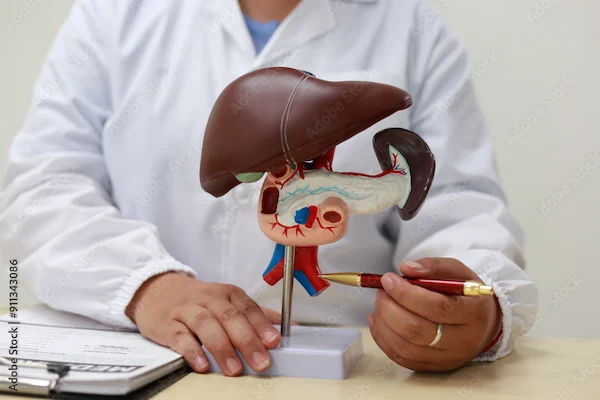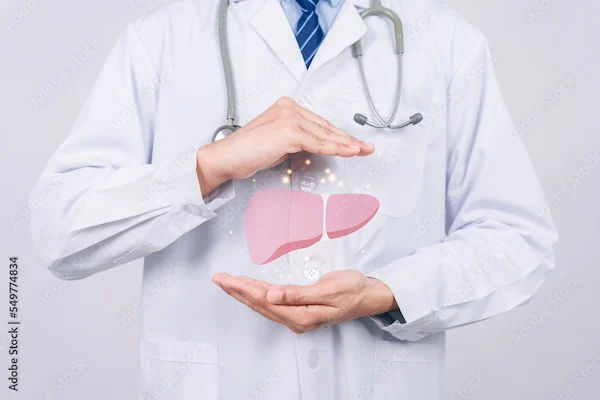Hepatitis: Types, Causes, Symptoms And Prevention Of Hepatitis
Learn about the different types of hepatitis, their causes, symptoms, and prevention methods. Understand how to protect yourself from hepatitis and maintain liver health through awareness and care.

Written by Dr.Sonia Bhatt
Last updated on 3rd Jul, 2025

Hepatitis is an inflammatory condition affecting the liver. While it is often caused by a viral infection, there are various other potential causes as well. These include autoimmune hepatitis, as well as hepatitis that develops as a secondary effect of medications, substances, toxins, or excessive alcohol use. Autoimmune hepatitis occurs when the body's immune system mistakenly attacks liver tissue.
Types of Hepatitis
Hepatitis can be caused by various factors, with viral hepatitis being common. It may be acute (less than six months) or chronic (over six months) and is contagious, sometimes spread through sexual contact.
There are five main viruses linked to viral hepatitis, identified as types A, B, C, D, and E. These types are particularly concerning due to their potential to cause severe illness and, in some cases, life-threatening complications. While each type has unique characteristics and modes of transmission, the symptoms they cause are often similar.
Causes of Hepatitis
Hepatitis can be caused by a variety of factors, resulting in inflammation of the liver. The primary causes include:
Viral infections: Hepatitis A, B, C, D, and E, each transmitted in different ways.
Excessive alcohol consumption: This can cause alcoholic hepatitis due to damage to the liver.
Medications and toxins: Certain drugs and environmental toxins may provoke hepatitis.
Autoimmune Diseases: When the immune system mistakenly attacks the liver, it leads to autoimmune hepatitis.
Metabolic Conditions: Conditions like non-alcoholic fatty liver disease (NAFLD) can contribute to hepatitis.
Genetic Factors: Inherited disorders, such as haemochromatosis or Wilson’s disease, can lead to liver inflammation.
Other Infections: Infections like mononucleosis or cytomegalovirus (CMV) may also cause hepatitis.
Transmission of Hepatitis
Hepatitis can be transmitted in various ways depending on the type, and understanding the routes of transmission is essential for prevention. Here’s an overview of how hepatitis spreads and how to protect yourself:
Hepatitis A: Spread through contaminated food, water, or sexual contact.
Hepatitis B: Transmitted via unprotected sex, sharing needles, direct blood contact, needle stick injuries, or from mother to child during birth. Pregnant individuals should be tested, and new-born’s should receive treatment within 12 hours if the parent is infected.
Hepatitis C: Primarily spread through sharing needles, blood contact, and needle stick injuries, with sexual transmission being less common.
Hepatitis D: Occurs in individuals already infected with hepatitis B and spreads via infected blood or from mother to child during birth.
Hepatitis E: Contracted through contaminated food or water or undercooked meat, especially in regions where the virus is common. It can be particularly dangerous for pregnant individuals.
What are the risk factors?
Hepatitis can be transmitted through several primary routes:
Infected Blood: Transmission occurs through shared needles or unsafe medical procedures.
Unprotected Sex: Hepatitis B and C can spread through unprotected sexual activity, highlighting the importance of using condoms.
Mother to Child: Hepatitis can pass from mother to baby during childbirth, but vaccination and medical care significantly reduce the risk.
Contaminated Food or Water: Hepatitis A and E are transmitted through contaminated food or water. Proper hygiene and consuming safe food are crucial for prevention.
Intravenous Drug Use: Sharing needles raises the risk of contracting hepatitis B and C.
Unsafe Body Modifications: Non-sterilised equipment used for tattoos or piercings can transmit hepatitis.
Sharing Personal Items: Items like razors or toothbrushes can spread hepatitis if shared with an infected person.
Metabolic conditions such as high cholesterol, high blood sugar, and obesity.
Living in or travelling to areas with poor sanitation.
Exposure to toxic chemicals in certain work environments.
What are the symptoms and early warning signs of hepatitis?
The most common symptoms of hepatitis include:
Dark urine
Abdominal pain
Yellowing of the skin or eyes (jaundice)
Pale or clay-coloured stools
Mild fever
Loss of appetite
Fatigue
Nausea
Joint pain
Diagnosis of Hepatitis
Healthcare providers use various tests to diagnose hepatitis and identify its cause, including:
Liver Function Tests: Blood tests that assess substances produced by the liver. Elevated liver enzymes or byproducts can indicate liver stress or dysfunction.
Imaging Tests: Techniques such as ultrasounds, MRIs, or elastography to detect liver swelling, issues with bile ducts or blood vessels, and other abnormalities. Some tests combine radiology with technologies like nuclear liver and spleen scans.
Liver Biopsy: A small tissue sample from the liver is taken and examined in a laboratory to identify diseases, infections, or toxins causing hepatitis.
During a physical examination, a healthcare provider may check for:
An enlarged or tender liver
Fluid in the abdomen (ascites)
Jaundice (yellowing of the skin)
Additional tests may include:
Abdominal ultrasound, MRI, or other imaging
Blood tests for autoimmune markers and hepatitis viruses (A, B, C, etc.)
Paracentesis if there is fluid in the abdomen
What are the treatments available for hepatitis?
Hepatitis A does not have a specific treatment, but early detection may allow prevention with the hepatitis A vaccine or immune globulin.
Chronic hepatitis B can be treated with the following medications:
Entecavir
Telbivudine
Tenofovir alafenamide
Tenofovir disoproxil fumarate
Interferon alfa-2b
Peginterferon alfa-2a
Hepatitis C is managed with medications such as:
Simeprevir
Sofosbuvir, Sofosbuvir/velpatasvir, Harvoni
Ombitasvir/paritaprevir/ritonavir
Glecaprevir/pibrentasvir
Chronic hepatitis D may require interferons, along with medications for hepatitis B. Hepatitis E is treated with peginterferon alfa-2a and ribavirin.
Complications and Long-term Effects of Hepatitis
Acute Hepatitis is usually temporary and often resolves on its own, although certain types, like viral hepatitis A, may last for months. Most causes of acute hepatitis don’t have direct treatments, but healthcare providers can help manage symptoms and monitor for complications. The main risk with acute hepatitis is acute liver failure, which is rare. It’s important to contact a healthcare professional if your condition worsens suddenly.
Chronic Hepatitis can persist for many years without causing symptoms, and many people don’t realise they have it until complications occur. Chronic hepatitis damages the liver over time, but the extent and speed of the damage can differ. Without treatment, around 25% of individuals may develop cirrhosis over several decades. However, with the right treatment, liver damage can often be improved.
Prevention Strategies Against Hepatitis
Vaccines are available to protect against various types of hepatitis, and limiting exposure to substances containing these viruses is an important preventive strategy.
Vaccines
The hepatitis A vaccine, administered in two doses, is typically given to children aged 12 to 23 months, but it is also available for adults, sometimes alongside the hepatitis B vaccine.
The hepatitis B vaccine is recommended for all newborns, with a series of three doses over the first six months. It is also advised for healthcare workers, as hepatitis B vaccination can help prevent hepatitis D.
Currently, there are no vaccines available for hepatitis C or E.
Reducing Exposure
Hepatitis viruses can spread through bodily fluids, contaminated water, and food. To reduce the risk of exposure:
Maintain good hygiene, especially when travelling to areas with a high prevalence of hepatitis.
Wash your hands thoroughly
Avoid consuming local water, ice, raw or undercooked shellfish, and unwashed fruits and vegetables in high-risk regions.
Refrain from sharing needles, razors, and other sharp objects.
Avoid contact with blood spills.
Do not use an infected person’s personal items.
Take care when getting tattoos or body piercings.
Ensure vaccinations are up to date when travelling, and drink bottled water in regions with poor sanitation.
Hepatitis B and C can also spread through sexual contact. Using barrier methods, such as condoms and dental dams, can reduce the risk of transmission.
Practise extra caution in places with high contact, such as nursing homes, dormitories, and day-care centres.
Conclusion
In conclusion, while some types of hepatitis cause short-term infections that the body can recover from, others can lead to both acute and chronic conditions, with chronic infections posing greater long-term health risks. Most people recover fully from hepatitis, though the healing process can take several months. Early detection, vaccination, and preventive measures play a crucial role in managing and reducing the risk of hepatitis infections.
Consult Top Hepatologists
Consult Top Hepatologists

Dr. E Prabhakar Sastry
General Physician/ Internal Medicine Specialist
40 Years • MD(Internal Medicine)
Manikonda Jagir
Apollo Clinic, Manikonda, Manikonda Jagir
(125+ Patients)

Dr. Srinivasa Reddy
Hepatologist
12 Years • MBBS, MD (General Medicine), DM (Hepatology),ASGE
Hyderabad
Myra Liver & Gastro Care, Hyderabad

Dr. Aakash Garg
Gastroenterology/gi Medicine Specialist
12 Years • MBBS, DNB (Medicine), DrNB (Gastroentrology).
Bilaspur
Apollo Hospitals Seepat Road, Bilaspur
(125+ Patients)

Dr. Aswin S. Krishna
Hepatologist
10 Years • MBBS, MD (Internal Medicine,MMC), DM (Hepatology, MMC), PDF(Fellowship in Liver Transplanatation)
Chennai
Apollo Hospitals Greams Road, Chennai
(100+ Patients)

Dr U V U Vamsidhar Reddy
Hepatologist
10 Years • MBBS, MD (JIPMER), DM (Hepatology, PGIMER)
Chennai
Apollo Hospitals Greams Road, Chennai
(100+ Patients)




